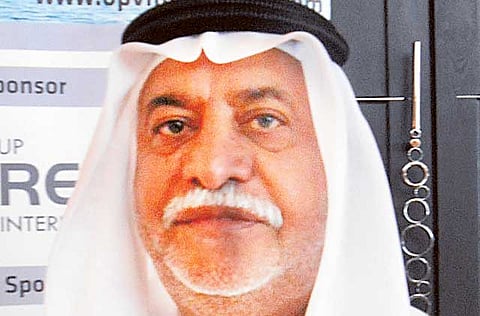Possible cut in US forces not a concern for GCC
Former naval chief Al Tunaiji says Gulf nations are moving in right direction on security issue

Abu Dhabi: Any possible reduction of US military presence in the Gulf, following a US-Iran friendship deal, is not a concern for the GCC States as they have already started enhancing their own military capabilities, an expert said in the capital on Monday.
The former Chief of the UAE Naval Forces Rear Admiral (Retired) Ahmad Mohammad Al Sabab Al Tunaiji, said the presence of foreign forces does not serve the interest of the GCC States.
“They are here for their own interest,” he told Gulf News on the sidelines of the Offshore Patrol Vessels (OPV) Middle East Conference in Abu Dhabi.
“So the GCC States do not have any other option but to increase own capabilities to protect themselves, and they are moving in that [right] direction.”
Al Tunaiji, who retired in 2010, said that apart from piracy, the naval forces have to tackle the challenges of sea pollution, trafficking of illegal immigrants, illegal fishing and smuggling of banned goods and drugs.
As an officer who worked with the UAE Naval forces for 35 years, he had rich experience in tackling all these challenges.
“When there was an embargo on Iraq during Iraq wars [in the early 1990s 2000s], vessels carrying smuggled oil from Iraq used to enter the UAE waters. Some of them have capsised near the UAE coast,” Al Tunaiji said.
“When Saddam Hussain’s forces set fire oil rigs in Kuwait while retreating from there, oil spills reached the UAE waters also. The Navy reports such matters to the government, which will assign expert agencies to tackle such crises.”
Pollution of sea water is a major threat to the GCC states because they depend on desalination of for potable water, he said.
As for piracy, he said the threat is mainly in the Indian Ocean but that UAE forces face certain unorganised groups in the region.
“They are not organised, like Somali pirates,” Al Tunaiji said.
Piracy is a major threat because it obstructs international trade, which is important for all nations.
The UAE navy often catches illegal immigrants coming by boat from different nations. Boat owners resort to this practise to make money.
Illegal fishing affects the marine resources and livelihood of legal fishermen, Al Tunaiji said.
Sign up for the Daily Briefing
Get the latest news and updates straight to your inbox



